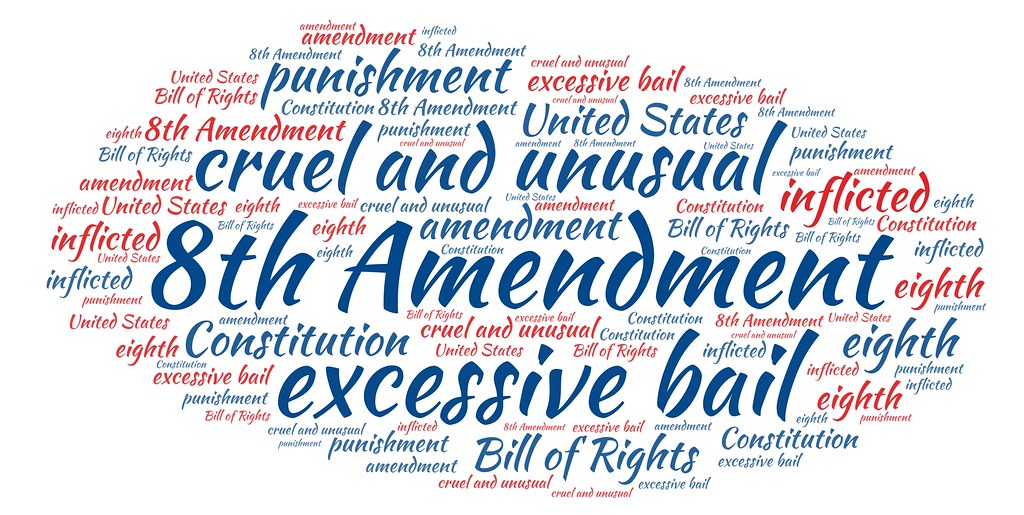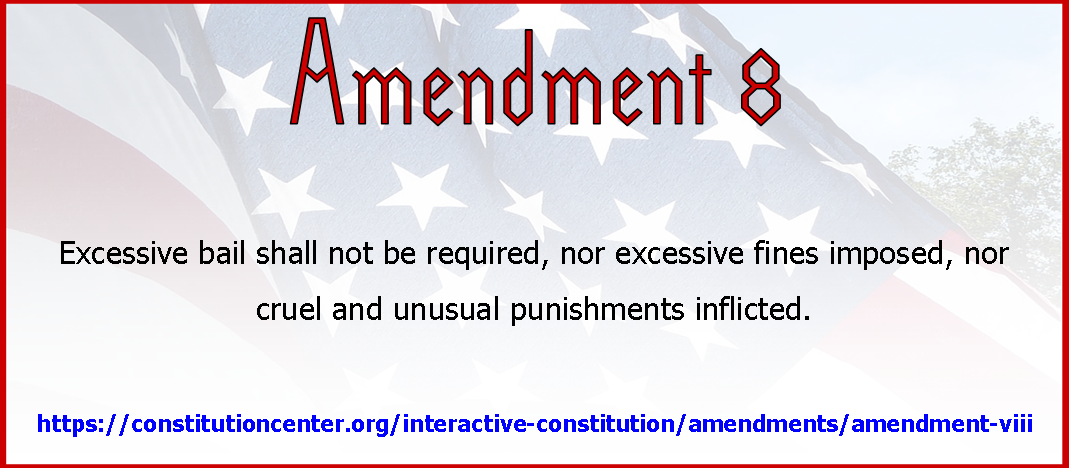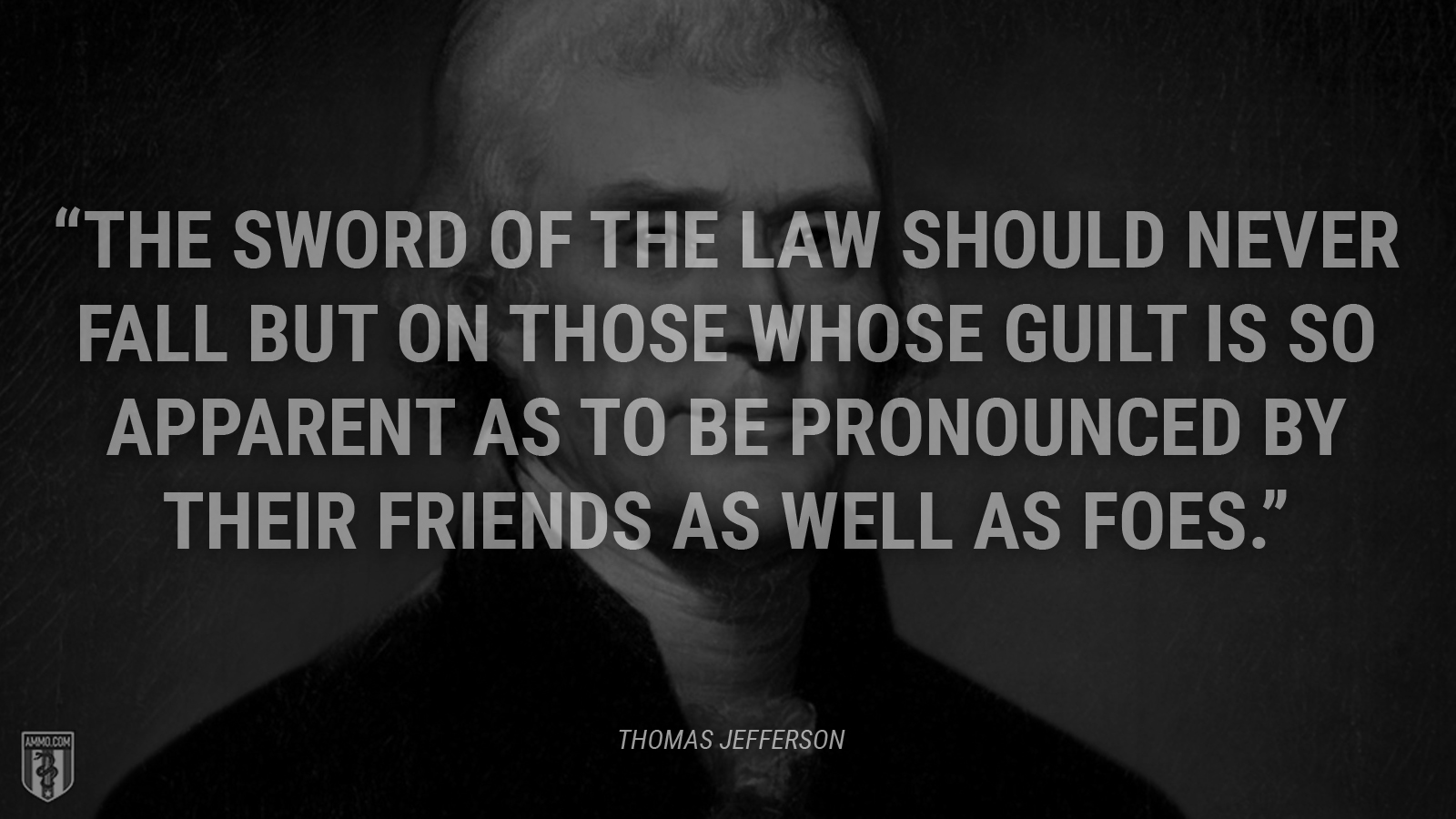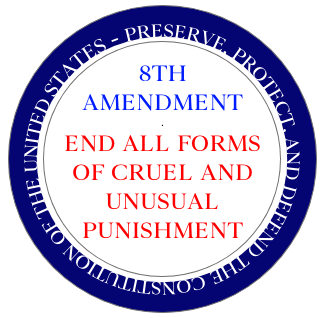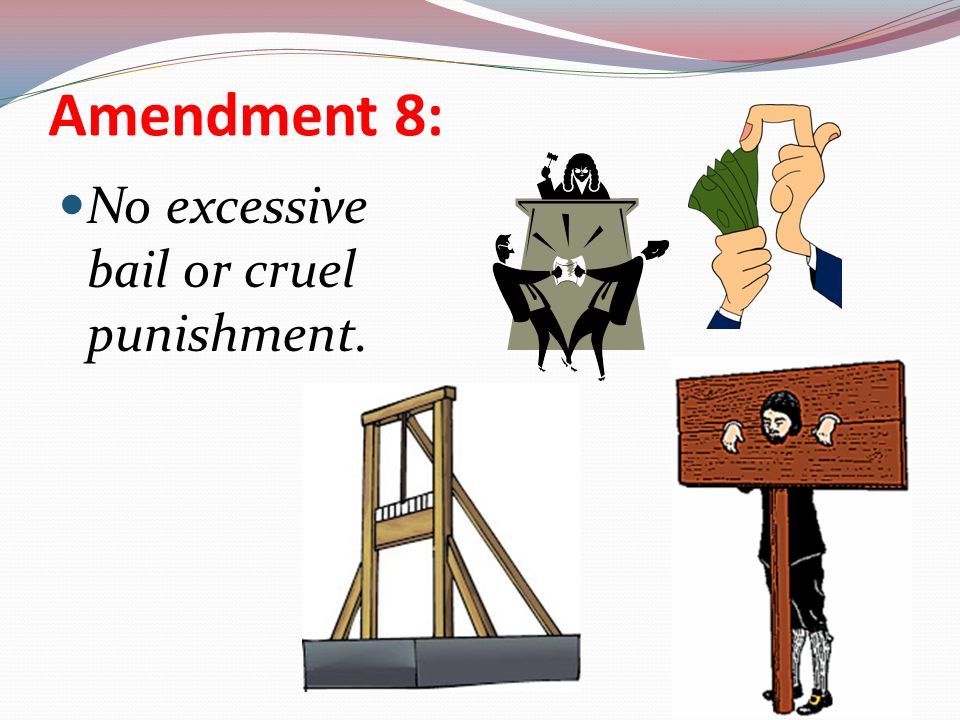Eighth Amendment Amendment VIII
The Eighth Amendment to the United States Constitution states: “Excessive bail shall not be required, nor excessive fines imposed, nor cruel and unusual punishments inflicted.”
Furman v. Georgia, 408 U.S. 238 (1972) – 8th amendment
Founding Fathers Quotes on Excessive, Cruel or Unusual Punishment in the Eighth Amendment
“Excessive bail shall not be required, nor excessive fines imposed, nor cruel and unusual punishments inflicted.”
Americans argue today about whether or not capital punishment is, in and of itself, cruel and unusual. The Founders would not have recognized it as so. In fact, “cruel and unusual” punishments to them referenced the torturous and disfiguring punishments which were going out of fashion even in their day, but were not too distance of a memory – things like branding, for example.
This Amendment also ensures that you receive reasonable bail and are not fined excessively. Like many other clauses in the Constitution, these are somewhat vague and subjective terms. It’s only through over 200 years of American jurisprudence that we have a firmer idea of what these mean, developed through trial and error, tradition and precedent. Indeed, this Amendment might be the one most subject to the fashions of the times. What is considered “cruel and unusual” in one era might be considered eminently reasonable in another. source
Which includes collateral relief where an inmate can show that no crime was committed might violate the Eighth Amendment prohibition against conviction for innocent conduct, affirmed in Supreme Court Jones v. Hendrix, 21-857 Nov 2022

The proposed Constitution made the federal government much more powerful than it had been under the Articles of Confederation. One of the most significant of these new powers was the power to create federal crimes and to punish those who committed them. Opponents of the Constitution feared that this new power would allow Congress to use cruel punishments as a tool for oppressing the people. For example, Abraham Holmes argued that Congress might repeat the abuses of “that diabolical institution, the Inquisition,” and start imposing torture on those convicted of federal crimes: “They are nowhere restrained from inventing the most cruel and unheard-of punishments, and annexing them to crimes; and there is no constitutional check on them, but that racks and gibbets may be amongst the most mild instruments of their discipline.” Patrick Henry asserted, even more pointedly than Holmes, that the lack of a prohibition of cruel and unusual punishments meant that Congress could use punishment as a tool of oppression: “Congress . . . . may introduce the practice of France, Spain, and Germany of torturing, to extort a confession of the crime. They . . . will tell you that there is such a necessity of strengthening the arm of government, that they must . . . extort confession by torture, in order to punish with still more relentless severity. We are then lost and undone.” Largely as a result of these objections, the Constitution was amended to prohibit cruel and unusual punishments.
As these debates demonstrate, the Cruel and Unusual Punishments Clause clearly prohibits “barbaric” methods of punishment. If the federal government tried to bring back the rack, or thumbscrews, or gibbets as instruments of punishment, such efforts would pretty clearly violate the Eighth Amendment. Most people also agree that the Cruel and Unusual Punishments Clause now limits state power as well as federal power, because the Fourteenth Amendment prohibits states from abridging “the privileges or immunities of citizens of the United States” and from depriving “any person of life, liberty, or property, without due process of law.”
But once we get beyond these areas of agreement, there are many areas of passionate disagreement concerning the meaning and application of the Cruel and Unusual Punishments Clause:
First and foremost, what standard should the Court use in deciding whether a punishment is unconstitutionally cruel? Should it look to the standards of 1791, when the Eighth Amendment was adopted? Should it look to contemporary public opinion? Should it exercise its own moral judgment, irrespective of whether it is supported by societal consensus? Should it look to some other standard?
Second, does the Cruel and Unusual Punishments Clause only prohibit barbaric methods of punishment, or does it also prohibit punishments that are disproportionate to the offense? For example, would it violate the Eighth Amendment to impose a life sentence for a parking violation?
Third, does the Cruel and Unusual Punishments Clause prohibit the death penalty? Many argue that capital punishment fails to advance any public good, that it is of a past era, and it should be eliminated. Proponents of the death penalty argue that some people have committed such atrocious crimes that they deserve death, and that the death penalty may deter others from committing atrocious crimes. They also point out that the punishment is authorized in a majority of states, and public opinion polls continue to show broad support for it.
Finally, are some modern methods of punishment – such as the extended use of solitary confinement, or the use of a three-drug “cocktail” to execute offenders – sufficiently “barbaric” to violate the Eighth Amendment?
There is not time or space here to answer all these questions, but the essays that follow will demonstrate differing ways of approaching several of them.
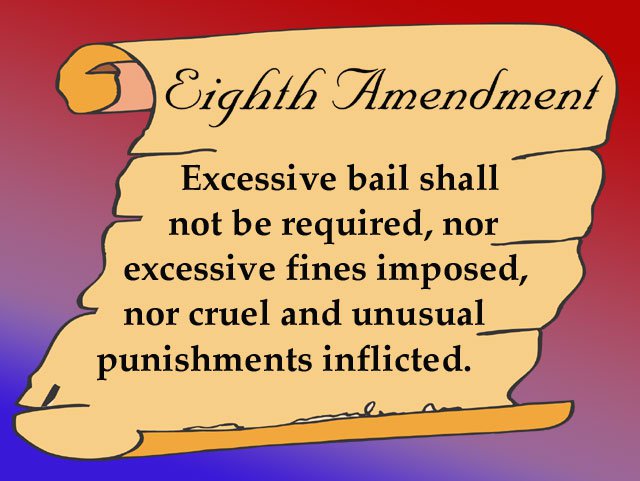
The Text
Excessive bail shall not be required, nor excessive fines imposed, nor cruel and unusual punishments inflicted.
The Meaning
No Excessive Bail: The first portion of the Eighth Amendment concerns bail— the money paid by a defendant in a criminal case in exchange for his or her release from jail before trial. Bail is returned to the defendant when he or she appears at trial but is forfeited to the government if he or she does not appear. In this way, bail provides an incentive for a defendant to remain in the area and participate in the trial.
Bail also promotes the ideal of being innocent until proven guilty, in that a defendant is not punished with jail time before he or she actually has been convicted. Bail also assists a defendant in preparing his or her case for trial, for it is far more difficult to consult with counsel when one is in police custody. The Eighth Amendment ensures that bail cannot be “excessive,” at an amount so high that it would be impossible for all but the richest defendants to pay it.
The Eighth Amendment however, does not guarantee an absolute right to be released on bail before trial. The U.S. Supreme Court has identified circumstances when a court may refuse bail entirely, such as when a defendant shows a significant risk of running away or poses a considerable danger to the community.
Prohibition against Cruel and Unusual Punishment: The better-known component of the Eighth Amendment is the prohibition against cruel and unusual punishment. Although this phrase originally was intended to outlaw certain gruesome methods of punishments— such as torture, burning at the stake, or crucifixion— it has been broadened over the years to protect against punishments that are grossly disproportionate to (meaning much too harsh for) the particular crime.
Except for a brief period in the 1970s, the death penalty has not been considered by the U.S. Supreme Court to be cruel and unusual punishment. As a result, Eighth Amendment challenges to the death penalty have focused on the methods used to carry out executions, whether certain offenders (for example, juveniles or the mentally retarded) should be subject to the sentence and whether death sentences are decided in a fair manner and by an impartial jury.
It is not just criminal sentences themselves that are subject to the cruel and unusual test; the Eighth Amendment’s cruel and unusual provision has been used to challenge prison conditions such as extremely unsanitary cells, overcrowding, insufficient medical care and deliberate failure by officials to protect inmates from one another. source
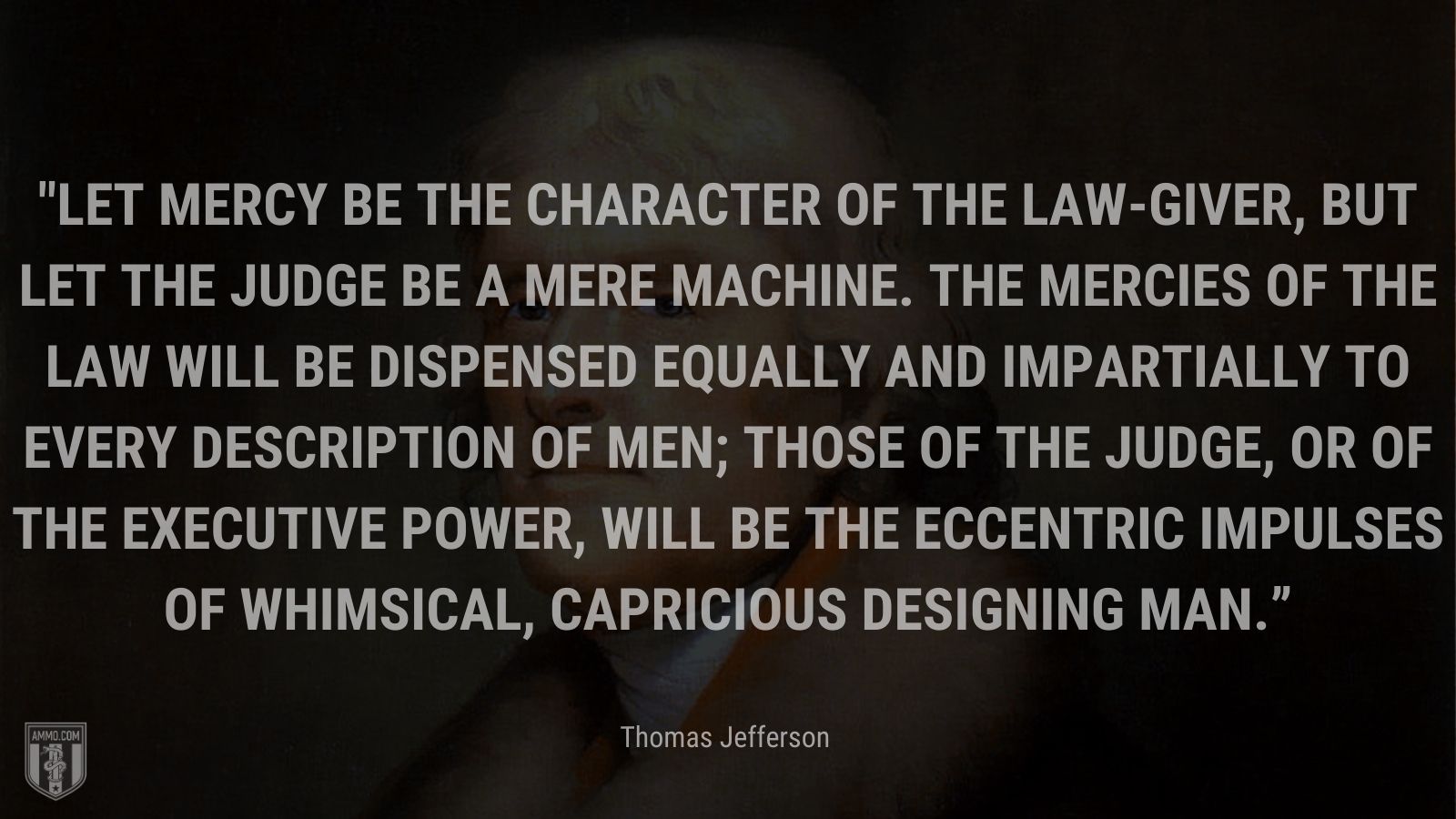
Eighth Amendment: Banning Cruel and Unusual Punishment
The Eighth Amendment to the US Constitution is part of the Bill of Rights. Along with the Fourth, Fifth and Sixth Amendments it recognizes procedural rights for persons accused of crimes. The purpose of these procedural rights is to protect an individual’s inalienable natural right to liberty. When originally ratified in 1791, the Bill of Rights protections applied only to the federal government. The Fourteenth Amendment’s “Due Process Clause” extended these protections to individuals accused of crimes by state governments as well.
1641 Massachusetts Body of Liberties & 1776 Virginia Declaration of Rights
In 1641, The Massachusetts Bay Colony adopted a Body of Liberties with a right to bail and a prohibition on cruel and inhuman punishments. The Eighth Amendment’s language is virtually identical to the 1776 Virginia Declaration of Rights.
The Eighth Amendment reads as follows:
“Excessive bail shall not be required, nor excessive fines imposed, nor cruel and unusual punishments inflicted.”
A defendant’s pre-trial detention is affected by the excessive bail clause. Excessive fines remain waiting a Supreme Court definition. Cruel and unusual punishment has been a major subject of Eighth Amendment litigation.
The Excessive Bail Clause
A person accused of a crime is presumed innocent until found guilty at a trial or pleads guilty in open court. It is difficult to prepare a defense and consult with counsel while in custody.
Bail is excessive when set at an amount higher than necessary to achieve a legitimate government purpose. If the purpose is to ensure a defendant’s appearance at trial, and if found guilty serve the sentence, then bail may not be set higher than needed to meet those ends.
To contest bail as excessive a defendant must ask for a reduction and if denied, appeal that decision. The Supreme Court has found that bail may be denied when it has been demonstrated that the defendant is a danger to the community.
The Excessive Fines Clause
The Supreme Court has not given definition to an excessive fine. In cases of indigents who may be imprisoned for failure to pay fines the Court has used the Equal Protection Clause of the Fourteenth Amendment and so has not addressed the amount of fines as excessive.
It is clear that large punitive damages in civil lawsuits are not covered by the Eighth Amendment. The Court has indicated that civil forfeiture proceedings where a person’s property is taken by the government related to a criminal proceeding may be subject to the Excessive Fines Clause, but the answer to that question has not been definitive.
The Cruel and Unusual Punishment Clause
Some punishments are forbidden entirely by the Cruel and Unusual Punishments Clause. In 1878, while upholding a sentence that a convicted murderer be “publicly shot” in Wilkerson v. Utah, the Supreme Court provided examples of punishment that would be cruel and unusual punishment for any crime:
- drawing and quartering
- public dissecting
- burning alive
- disemboweling
These were the English punishments for treason when the Declaration of Independence was proposed and signed. The men pledging their lives, fortunes and sacred honor were risking the punishments that would be banned by the Constitution’s Eighth Amendment. It is impossible to understand the Constitution without knowledge of the Declaration.
The Death Penalty as Cruel and Unusual
In 1972, the Supreme Court outlined a test to determine if the death penalty[1] is banned by the Eighth Amendment in Furman v. Georgia. The elements of the test are:
- The “essential predicate” is “that a punishment must not by its severity be degrading to human dignity,” especially torture.
- A severe punishment that is obviously inflicted in wholly arbitrary fashion.
- A severe punishment that is clearly and totally rejected throughout society.
- A severe punishment that is patently unnecessary.
The Court found that sentences of death were being imposed in an arbitrary fashion, and that the discretion and lack of direction to given to judges and juries was resulting in some similarly situated defendants receiving death sentences while others did not. The Court determined this was “cruel and unusual”. As a result, no executions took place over the next four years while states revised their capital punishment laws. Many of the revised laws provided for separate trials as to a defendant’s guilt and a second “trial” regarding the appropriate penalty. The Supreme Court found such laws were not arbitrary in the 1976 case of Gregg v. Georgia and executions resumed.
On January 17, 1977, convicted murderer Gary Gilmore told a Utah firing squad, “Let’s do it.” and became the first prisoner executed under the new death penalty laws.
Court Employs “Evolving Standards of Decency” To Limit Death Penalty
Though the death penalty is recognized in the Constitution and is not “cruel and unusual” generally in the Eighth Amendment sense, the Supreme Court has found that it offends the constitution in certain circumstances. In 1977, the Court found death was an inappropriate punishment for the crime of rape. In 1982, the Court found the death penalty unconstitutional when applied to someone convicted of “felony murder”.[2] In 2002, the Supreme Court determined that the execution of a mentally handicapped defendant was cruel and unusual. In 2005, the Supreme Court determined that the execution of a person who was younger than 18 at the time the crime was committed was cruel and unusual.
[1]Arguments have been made that the death penalty itself is cruel and unusual. The Constitution acknowledges the death penalty in both the Fifth and Fourteenth Amendments. Despite arguments made that death is cruel and unusual, for it to be an unconstitutional penalty, the Constitution would need to be amended.
[2]“Felony murder” takes place when, while a felony is being committed, another person dies, although there was no intent by the offender to kill someone. For example, if there’s a car chase following a crime and a pedestrian is hit and killed, there is the possibility of a charge of “felony murder”. The Supreme Court has generally excluded the death penalty for cases involving felony murder, but it may be available for a defendant that has shown “reckless disregard” for human life. source

